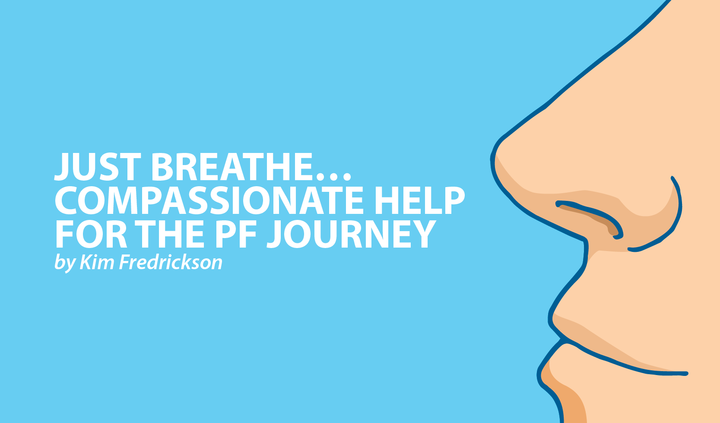My Struggles and Solutions for Dealing with Depression


Depression is a common problem for patients with pulmonary fibrosis. It makes sense; we are trying to process being diagnosed with this disease, and its effects on us now and in the future. There is so much to handle as we seek treatment, and obtain the services we need. We are also worn out as we adjust to our new normal … and that’s just a few things on the list.
I wrote a column a while back about how normal it is to be sad, frustrated, angry, and overwhelmed by all the emotions that come with our diagnosis. It’s also common for patients, as well as caregivers, to struggle with depression because of ongoing stress and grief.
Some studies estimate that depression is 1.5 to 7 times more likely to occur in individuals with chronic illness than in the general population. The Pulmonary Fibrosis Foundation states in its Support Group Leader Guide, “There is a high prevalence of depression and anxiety in people living with PF and their partners. These appear to be related to increasing symptoms and decreased quality of life.”
A therapist’s perspective
As a marriage and family therapist for over 30 years, I’ve treated many people who have struggled with depression. Many do not realize that prolonged stress can change our brain chemistry, causing our brains to no longer produce enough of the normal anti-depressants they used to. As patients, we go through many sources of ongoing stress.
Since it is common for PF patients to develop depression, I’ve been trying to notice how I’m feeling. Sometimes depression can creep up on us, so I want to be as active as I can to head it off at the pass. For me, it’s a challenge to distinguish depression from the grief I feel about the way my life has changed, and the normal tiredness I feel from having PF.
Talk to your doctor
My pulmonologist often asks if I’m feeling depressed, which I appreciate. Many studies show that diagnoses of anxiety and depression in PF patients are frequently missed. If you are dealing with depression that doesn’t seem to be lifting, please talk to your doctor about it.
Many ways to deal with depression
Here’s some ideas that may help:
- Talk Therapy — Just being able to talk with someone really helps. It is common for patients to not share distressing feelings with family members, because they don’t want to burden or worry them. The great thing about talking to a therapist is you can share whatever you want, find empathy and understanding, and get ideas that might help. The best way to get a referral is through your doctor or a friend.
- Exercise — Now I know how hard this is. I’m on 8 lpm sitting and 10 lpm walking, so I understand what a challenge this can be. I go to pulmonary rehab twice a week, which I’ve discussed in a previous column. There are also exercises you can do while sitting down. I’m starting a new program this week, so I’ll tell you more about how it goes in a couple of weeks.
- Support Groups — Joining an online or in-person support group with other patients who understand what you’re going through. Here’s some ideas to check out.
- Medication — Sometimes medication can get our brain chemistry back to functioning like it used to. It can take four to six weeks to notice improvement. Medication use doesn’t have to be long term, although it can take six to nine months for your brain to reset itself. Talk to your doctor about this possibility. Your pulmonologist, primary care doctor, psychiatrist, or nurse practitioner can prescribe medication (at least in the United States).
Let’s do all we can
I encourage you to seek help if you are struggling with depression. We are are going through so many hardships. Let’s not let depression take away the good moments and joys in the life we have left to live.
I would love to hear from you. What stood out to you in this column? Have you struggled with depression? What helps lift your mood?
We’re in this together, and we can benefit from our combined courage, experiences and support. Please share this post with anyone you think could benefit, or on social media.
***
Note: Pulmonary Fibrosis News is strictly a news and information website about the disease. It does not provide medical advice, diagnosis, or treatment. This content is not intended to be a substitute for professional medical advice, diagnosis, or treatment. Always seek the advice of your physician or other qualified health provider with any questions you may have regarding a medical condition. Never disregard professional medical advice or delay in seeking it because of something you have read on this website. The opinions expressed in this column are not those of Pulmonary Fibrosis News, or its parent company, Bionews Services, and are intended to spark discussion about issues pertaining to pulmonary fibrosis.







JUDY KRASOVEC
Right now I don't think it's depression , more like frustration. I still do many things , yard, lunch, groceries, etc. It just is so tiring by the time I get everything ready I'm already tired. I've been trying to get a lighter little purse so I don't have so many straps well I went to a book signing ,decided to just take my wallet(but because I'm trying to be organized I always clip my keys to my purse, ) and I took wallet and put purse in trunk of car. LOCKED OUT COULDN'T REMEMBER ANY ONES PHONE # HUSBAND IN BED NO MONEY FOR CAB TOO MUCH STRESS
Kim Fredrickson
Hi Judy,
That's a good distinction...more frustration than depression. Having PF really is frustrating. I feel the same way, by the time I get ready I'm exhausted. What a scary experience you had! I think we all fear that happening. You are brave and courageous!
Carolynn Fishleigh
I appreciated your column on depression. I went through the grieving process for the good health I no longer have and came out the other side of it reasonably happy, determined to make the most of whatever time I have left. I have my moments when my blood runs cold, which is when the reality of what is happening knocks at my consciousness. But it is fleeting and then I continue on making the most of life that I can. I think I am able to do this more so than for some other people because I have had periods in my life which were very, very difficult and I had to come to terms with all that and come out the other side. So I've done it before and I find I can do it now. I don't like that I have to do it, but I know I can. To tell you the truth, I appreciate your honest remarks about what this condition is really like. Every day I project out love and positive energy to this entire community and a prayer for a cure. I suggest that everyone of us take 5 minutes a day and visualize our faces all radiantly happy because they just announced a cure for this disease. This kind of visualization has worked for me in the past in other situations and I believe it can work now for this one. Try it, you have nothing to lose.
Kim Fredrickson
Carolynn, Thanks so much for sharing. I love your perspective...letting yourself grieve, and then adjusting, and enjoying as much as you can. Love your visualization...that is a wonderful idea!!!
Lea
Wow. I was badly depressed on the day I received this....
All suggestions are well received.
JUDY - I had a similar experience. I finally learned to only buy clothes with pockets and a wallet similar to a man's wallet. Everything goes in my pocket now. My oxygen tank goes in a mesh backpack that was on sale last fall at school's beginning time. I feel a little embarrassed at carrying a wallet as a man does, but I remember how it has helped.
Kim Fredrickson
Dear Lea,
Thanks so much for sharing. I'm so glad this column came at a good time. I hope some of my suggestions were a help to you. What great suggestions you shared...thanks so much!
Tom Nicholas
I was a middle manager for a Fortune 100 Corporation. In the early 1990's, for several reasons I suffered a severe depressive episode, was hospitalized for a few days, in full time group therapy for several weeks, and then finally part time therapy. It was a "life changer" for me...my life became so much better! Over 19 years ago, my mother died of pulmonary fibrosis. It was fairly quick but a devastating time watching her stuggle to the very end. Now I have IPF(probably hereditarial)and find myself every now and again on a brief downward spiral. However, I know how to recognize the symptoms and have been blessed with the ability to overcome the depression...or best put, keep it at bay. However, watching my spouse and close friends, I realize it is not easy for them either. What I would share with the group is a little "Godsend" given to me when I was treated for depression. It is a book entitled "The Feeling Good Handbook" by David D. Burns M.D. I read this book often when I feel I need a "tune up", or perhaps want to help someone else. I highly recommend this book to any person with IPF and especially to "caregivers" and their families. Many times one does not know they are suffering from depression, and certainly those around you can help and support you. Depression can sneak up on you and grab you while you are unsuspecting there might be something wrong. Ask for help!
Kim Fredrickson
Tom, Thanks so much for sharing your personal journey with battling, and overcoming depression. I love the book you mentioned! A great resource, I'm so glad you shared it. Thanks for your great encouragement and advice!